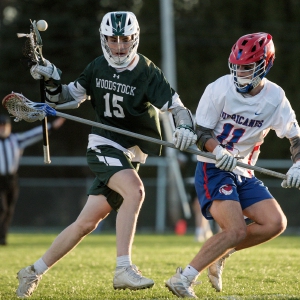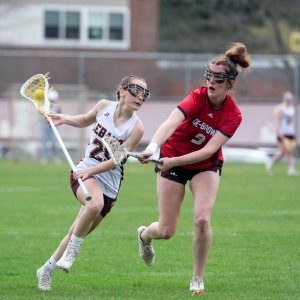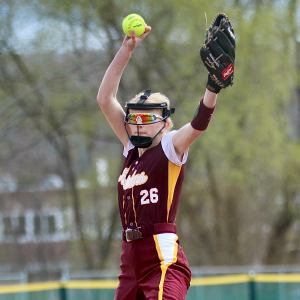First Person: Time winding down for interim Dartmouth AD Peter Roby
| Published: 05-28-2022 10:11 PM |
Peter Roby, Dartmouth’s interim athletic director and a former Big Green basketball standout, is nearing the end of his time on the job and said he expects an announcement about his permanent replacement to occur around June 1.
Roby, 64, arrived in February 2021, stepping into a difficult situation less than three weeks after his alma mater reinstated five teams it had announced would be cut the previous summer.
Dartmouth had just settled a lawsuit alleging the cuts violated Title IX compliance, and athletic director Harry Sheehy and deputy athletic director Bob Ceplikas both retired within weeks of that action.
COVID-19 concerns caused the Ivy League to cancel sports seasons during 2020 and 2021, and Big Green teams have continued to struggle to post winning campaigns since returning to action.
The Valley News recently interviewed Roby to get his thoughts on his year’s work. The text has been edited for clarity and length.
■
Valley News: How would you describe your job during the last year?
Peter Roby: When (college president Phil Hanlon) and I first talked, he was interested in me bringing leadership to the department, in helping to stabilize things and to help people feel energized after having gone through a lot.
Article continues after...
Yesterday's Most Read Articles
We’ve done a lot of assessment so that whoever comes in next (as athletic director) has a road map to follow. And we’ve given the staff a sense of being positive and looking forward to the future, that they’re supported and valued.
VN: What’s involved in the road map?
PR: One part is that last summer we commissioned a study on our facilities and how we can better use space. Some of them were built 60, 70, 80 years ago and before we sponsored 35 teams. Over time, the use of those facilities has changed and the needs of teams has evolved.
We got input from some architectural firms so that if the college had the money and was prepared to use it, here’s what’s recommended. It’s information that would help inform whatever decisions might be made in the future.
VN: Did you ever consider taking the athletic director’s job full time?
PR: No, although there may have been some hope that I’d get here and get excited and want to stay. I have a life I want to lead and things I want to prioritize when I get back to being retired.
VN: What did you not anticipate about the situation before you dove in?
PR: I’ve really been struck by how generous and supportive our donors and friends have been, even with the tough times the department has been through. People kept stepping up and offering support, and I’ve been really humbled by that.
VN: What’s the most important thing you’ve done in your time back?
PR: It didn’t strike me that there had been much of a productive approach to promoting the value of the athletic experience here. There’s a need for advocates for athletics, and I’ve tried to be that champion. I speak about it to the senior leadership team of the college, the board of trustees, our major donors — anybody who will listen.
The students who are recruited to play at Dartmouth are a very unique and special group, but what it takes to play Division I athletics isn’t always appreciated. We have to put that in context at a school that values academic achievement and excellence.
VN: In the summer of 2021, Dartmouth issued a stated goal of decreasing future student-athlete admissions by 10%. Is that still in effect?
PR: I think that’s still the goal, and I don’t necessarily agree with it because of all that athletes have brought to campus life over the generations. They compete really well in the classroom and on the playing field and graduate and bring distinction to the college.
It’s something the college needs to continue to think about, because we more than represent its values. If it can grow its undergraduate population, there will be less tension on this point. I’m not fearful the character of the college will change, and I think people are becoming more comfortable with that idea. So hopefully it will not be if, but when.
VN: The athletic department has experienced recent budget cuts. How has that impacted operations?
PR: It’s not unique to athletics. Over the last couple of years and because of COVID and needing to raise money for financial aid, all departments have been asked to tighten their belts. But there’s only so much tightening you can do before it starts to impact the experience.
That’s why the college needs to think of ways it can continue to grow revenues and not simply continue to cut. When the largest part of your enterprise is people and you’re not filling positions, those who remain are getting burned out.
The good news is the college is on record as being ready to make investments in athletics. We’ve done gender equity and other reviews to see how we compare with our peers, and that outside perspective has more impact.
VN: You’ve hired coaches but not fired any, despite some poor team records. Why?
PR: Keep in mind that coaches are coming out of COVID, and there’s been so much disruption that they’re starting over with recruiting and the culture of their teams and getting back to a strong level of play.
I don’t think it would have been fair to ask anyone to leave. I’m just now having a chance to evaluate people over this last year. If I felt like someone wasn’t treating their athletes appropriately or not living the values of the institution and didn’t want to change their behavior, I wouldn’t have hesitated to make a change.
VN: Why have some Dartmouth teams struggled so much?
PR: Because there are other schools in this league that have very good teams. They’re going for it, they’re raising a boatload of money, they compensate their coaches well and have terrific facilities and reputations that make it challenging for us.
What I’ve been promoting all this year is we need coaching staff continuity. We need to allow coaches to settle in and build culture. Then we can start to move up in the Ivy League.
VN: You mean assistant coaches as well, not just the head coaches?
PR: We’ve got to compensate all our coaches better, especially the assistants, because they’re the ones out on the road recruiting. If you’re turning over your assistants every two or three years, it’s hard to develop continuity with knowing how admissions works and knowing the talent needed to compete in the league.
You have to have assistants long enough that they can build relationships with high school coaches and recruits and become an extension of their head coach at Dartmouth. If you have to recruit new staff every couple of years, it’s costly and disruptive.
VN: Why does keeping up with Ivy League competitors such as Harvard, Yale and Princeton seem perpetually out of reach?
PR: Those schools got a head start in the kind of fundraising for athletics and the endowments they’ve established. They were probably at that game earlier than we were.
We’ve made a lot of progress over the last three or four years with the number of our endowed coaching positions rising. That helps stabilize costs and gives people clarity on how best to plan.
If you don’t have that surety, it’s hard to plan more than a year out because every year you’re relying only on annual appeals to bring in a certain amount. You can only plan once that money’s there.
Tris Wykes can be reached at twykes@vnews.com.

 Woodstock boys lax defense steps up, holds off Hartford
Woodstock boys lax defense steps up, holds off Hartford Pick a sport and Pete DePalo’s has probably officiated it over the past 40-plus years
Pick a sport and Pete DePalo’s has probably officiated it over the past 40-plus years Lebanon girls lacrosse prevails over Coe-Brown
Lebanon girls lacrosse prevails over Coe-Brown Local roundup: Lebanon softball sweeps wins from Souhegan, Stark
Local roundup: Lebanon softball sweeps wins from Souhegan, Stark
